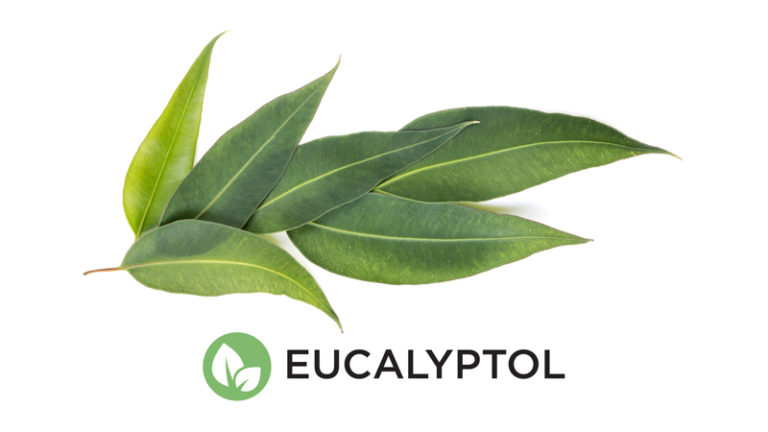 Photo by: Gina Coleman/Weedmaps
Photo by: Gina Coleman/WeedmapsImage lightbox

Chemically, eucalyptol is a cyclic ether and monoterpenoid with a fresh, minty scent and a spicy yet cooling taste. Eucalyptol may also be referred to by other synonyms, notably cineol. This terpene is present in cannabis as well as sweet basil, rosemary, sage, bay leaves, camphor laurel, tea tree and, of course, eucalyptus. Eucalyptol is known for possessing respiratory and anti-inflammatory medicinal properties.
What is eucalyptol?
The eucalyptol terpene was first identified by French chemist Francois Stanislas Cloez in 1870. But long before the 19th century, herbal medicine channeled eucalyptus to act as a cough suppressant, mood lifter, and antibacterial cleanser. Today, eucalyptol still has myriad usages, starting with its prominence in the wellness industry as a massage oil and aromatherapy supply.
Many brand name companies also incorporate eucalyptol into cold and sinus medications, because the terpene aids breathing. The tobacco industry has also made frequent usage of eucalyptol, adding it to cigarettes to improve flavor.
While eucalyptol can be a culinary ingredient in low doses, the terpene is toxic in high doses, adversely affecting the respiratory tract, nervous system, and reproductive system. Like other terpenes, including cedrene, eucalyptol may be part of the chemical formula for commercial insecticides. However, eucalyptol has shown to be attractive to male orchid bees, and the terpene may even cause the bees to behave more territorially aggressive.
Eucalyptol in everyday life
Eucalyptol uses are wide-ranging and you may find the terpene in your medicine cabinet, in a sweet treat, or at the spa. You've probably encountered eucalyptol in a box of cough drops or a bottle of mouthwash. You may have experienced very low levels (0.002%) of eucalyptol in a pastry from the bakery, a soft drink, or a chewy candy. You have probably sprinkled eucalyptol into your dishes, perhaps through rosemary or bay leaves. Spas use eucalyptol oil in massages, facials, or body treatments.
Therapeutic benefits of eucalyptol
Eucalyptol benefits are very well characterized compared to some other, less common terpenes such as fenchol. Studies have shown eucalyptol to have wide-ranging benefits in reducing respiratory symptoms and even sharpening memory.
Anticancer
A 2013 study published in the journal Oncology Reports found that eucalyptol (referred to as cineole in this study) suppressed human colorectal cancer cell growth. Research is still emerging on the topic of cancer and eucalyptol, but the scientists in this study suggested that eucalyptol could be an effective strategy to treat colorectal cancer.
Respiratory and anti-inflammatory
Many studies, and several placebo-controlled clinical trials (the gold-standard in human research), have thoroughly demonstrated the efficacy of eucalyptol for various respiratory disorders. Patients suffering from asthma, pneumonia, bronchitis, COPD, and even cigarette smoke irritation may all benefit from eucalyptol's ability to improve lung function and reduce mucus; it may even boost the effectiveness of the flu vaccine. Many of eucalyptol's benefits derive from its anti-inflammatory and antioxidant actions.
Cognitive function
Inflammation in the brain is a hallmark of, and major contributor to Alzheimer's Disease. A 2014 study published in Neurochemistry Research found that eucalyptol (cineole) reduced the signs of inflammation caused by amyloid beta peptides (which play a key role in Alzheimer's). Although this study was done in petri dish models, other human studies have shown that exposure to eucalyptol (in rosemary oil), and the terpene's presence in the bloodstream were positively correlated with increased cognitive performance.
Role of eucalyptol in cannabis
Super Silver Haze, Headband, Bubba Kush and Girl Scout Cookies are some of the cannabis varieties that contain eucalyptol. Because eucalyptol can simultaneously relieve pain, lower blood pressure, and improve breathing, cannabis with this terpene may present these benefits. The sensory experience may be perceived as refreshing or cooling due to the aromatherapeutic and flavor profiles of eucalyptol.
Bottom line
Eucalyptol offers a variety of well-established medicinal benefits, and fills the senses with its distinctly herbal aroma and cool flavor.
Major contributions from Dr. Adie Rae.

